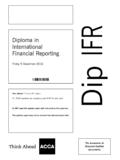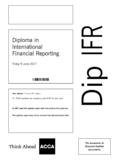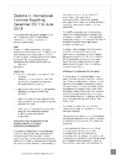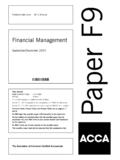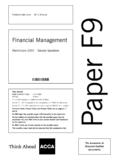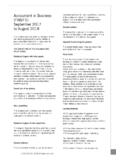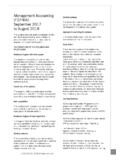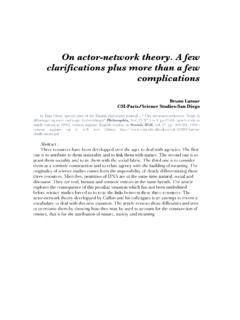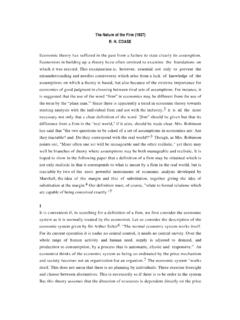Transcription of AN INTRODUCTION TO PUBLIC FINANCIAL MANAGEMENT
1 AN INTRODUCTION TO PUBLIC FINANCIAL MANAGEMENT Authors: 1. Arsalan Shaikh, ACCA (Member, Subcommittee for the PUBLIC Sector - ACCA Pakistan); 2. Nida Naeem ACCA, Member, Members Network Panel ACCA Pakistan & Chairperson, Subcommittee for the PUBLIC Sector PUBLIC FINANCIAL MANAGEMENT (PFM) is concerned with aspects of resource mobilisation and expenditure MANAGEMENT in the PUBLIC sector (for definition of PUBLIC sector please read ACCA's policy document 'Setting high professional standards for PUBLIC services around the world' (2012) Since the private sector lacks the moral sentiment and incentives of a responsible government to provide for various segments of the economy, including the underprivileged, the PUBLIC sector's role is significant.)
2 Expenditure on PUBLIC services accounts for more than one third of GDP in most countries, hence interest and expectations of these services are high and MANAGEMENT of PUBLIC funds needs to be able to withstand scrutiny from all quarters. Objectives of PUBLIC FINANCIAL MANAGEMENT : In a business enterprise, effective MANAGEMENT of finances aids the achievement of business objectives. Similarly, sound PUBLIC FINANCIAL MANAGEMENT is critical to the achievement of the aims of the PUBLIC sector through its role in improving the quality of PUBLIC service outcomes; operational and strategic decision-making; long term sustainability of PUBLIC services; building PUBLIC trust in the performance of the sector; and ensuring the efficient and effective use of PUBLIC funds.
3 Optimal PUBLIC FINANCIAL MANAGEMENT would additionally display flexibility that allows the targeted sectors to adjust easily and in the desired manner with the PUBLIC sector induced changes. ACCA has identified four key objectives that effective PUBLIC FINANCIAL MANAGEMENT should cover: aggregate FINANCIAL MANAGEMENT - fiscal sustainability, resource mobilisation and allocation operational MANAGEMENT - performance, value for money and strategic FINANCIAL planning and MANAGEMENT governance - transparency and accountability Fiduciary risk MANAGEMENT - controls, compliance and oversight (Parry 2010). Guidance Note on PUBLIC FINANCIAL MANAGEMENT 1. Aggregate FINANCIAL MANAGEMENT A state normally mobilises its revenue from natural resources under its control, collection of taxes from the PUBLIC , borrowings, establishment or sale and privatisation of state owned corporations.
4 These resources are then allocated to various PUBLIC departments in the annual budget according to the priorities that have been identified and agreed upon by the different stakeholders. PUBLIC FINANCIAL MANAGEMENT is not only crucial in meeting fiscal aims, monitoring progress against targets and effective utilisation of resources, but a sound system can aid the government in setting future priorities and ensuring fiscal sustainability. 2. Operational MANAGEMENT Sound FINANCIAL MANAGEMENT has a direct impact on short and long-term decision-making, performance measurement, strategic planning and MANAGEMENT of PUBLIC services. Some operational aspects that are directly affected through FINANCIAL MANAGEMENT are described as follows.
5 A) Asset Acquisition & Disposal Financing capital assets are some of the key decisions in the MANAGEMENT of FINANCIAL resources as they involve significant outflow of resources. In an efficient FINANCIAL MANAGEMENT system, alternative options are explored to finance capital assets in such a way that liquidity is maintained in the successful pursuit of long term objectives. A good governance structure consists of a system of authorisations requiring consent from all the stake holders (or their representatives) before execution of material contracts. Recent years have witnessed growing interest in alternative means of financing. One in particular namely 'Islamic Finance' has gained prominence in both muslim and non-muslim majority countries.
6 In Pakistan, analysts have recommended that the government should explore a rehabilitation program financed by issuing long term Sukuk (Islamic Bonds) for loss-making state-owned enterprises. B) Treasury MANAGEMENT Managing FINANCIAL resources with the objective of maximising its value involves sufficient risks. In PUBLIC finance, sound treasury MANAGEMENT balances the value maximisation objective of the government with the need to maintain liquidity for the discharge of institutional liabilities. As PUBLIC funds are at stake, preferred investment opportunities are typically those which are medium to low risk in nature. Guidance Note on PUBLIC FINANCIAL MANAGEMENT Recent years have been tough on the government of Pakistan, specifically short term liquidity has been a pressing concern.
7 The government owes billions of rupees on account of circular debt. In the fiscal year 2011-12, the government auctioned several treasury bills including Islamic Bonds or Sukuks to raise 159 Billion Rupees in order to meet its incumbent commitments. At the end of June 2012, one of the main ingredients of the total domestic debt of Pakistan was Ijara Sukuk. The success and popularity of these (and other Islamic Finance) instruments in Pakistan and abroad may be attributed to the fact that they are backed by tangible assets. In the year 2012, a record $144 billion worth of new Sukuks were issued worldwide, making them the most popular investment instrument in Islamic banking and finance. C) Review and Performance Evaluation Performance evaluation is a critical process for identifying and understanding the mistakes of the past, so as to formulate and implement insightful strategies in the future.
8 For productive performance evaluation, performance targets and appraisal methods should be decided inclusively and by consensus within stakeholders to facilitate understanding, monitoring and evaluation of targets and to encourage ownership of shared goals and outcomes. In the PUBLIC sector, where PUBLIC services are often provided in partnership with other PUBLIC , private or third sector entities or where investment by one sector of PUBLIC services may trigger or cause improvements in the outcomes of another (for an effective federal vaccination campaign in decreased hospital admissions in an individual district / state without any deployment of resources at local level), performance evaluation of individual PUBLIC entities becomes all the more challenging.
9 Insightful performance evaluations may lead to surprising discoveries and revolutionary solutions. As an example, in order to optimize the use of limited PUBLIC funds, governments can benefit by considering automation and re engineering of processes and by phasing out activities that do not add value. D) Reporting to stakeholders An important aspect of FINANCIAL MANAGEMENT , stewardship and the mechanism by which entities meet their FINANCIAL accountability obligations, is the preparation and publication of annual audited FINANCIAL statements in entities annual reports. The purpose of FINANCIAL statements is to present a true and fair view of an entity s FINANCIAL performance, position and cash flows. As such, they are an important means of demonstrating how the PUBLIC sector, both at individual entity and at government level, discharges its FINANCIAL MANAGEMENT responsibilities.
10 Although, both cash and accruals basis accounting is being employed by different countries around the world, in the long term the accruals basis of accounting is preferable to account for PUBLIC funds as it increases transparency and accountability. Guidance Note on PUBLIC FINANCIAL MANAGEMENT It is believed that the timely finalisation of an entity's FINANCIAL statements, accompanied by an unmodified audit opinion, is an important indicator of the effectiveness of an entity s FINANCIAL MANAGEMENT performance. Sound FINANCIAL MANAGEMENT fosters confidence that the entity is using PUBLIC funds efficiently to provide value for money. The methods of reporting for PUBLIC services are continually under debate due to the diverse nature of services provided by the PUBLIC sector, overlap between services provided by different PUBLIC sector organisations and the presence of multiple stakeholders.

